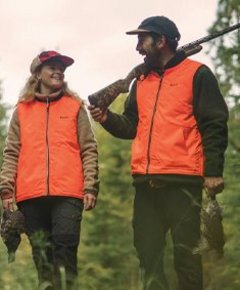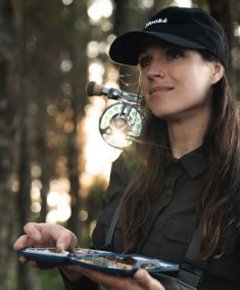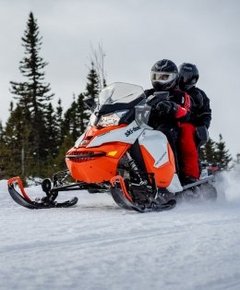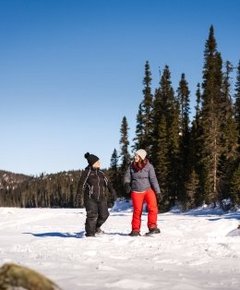FAQS
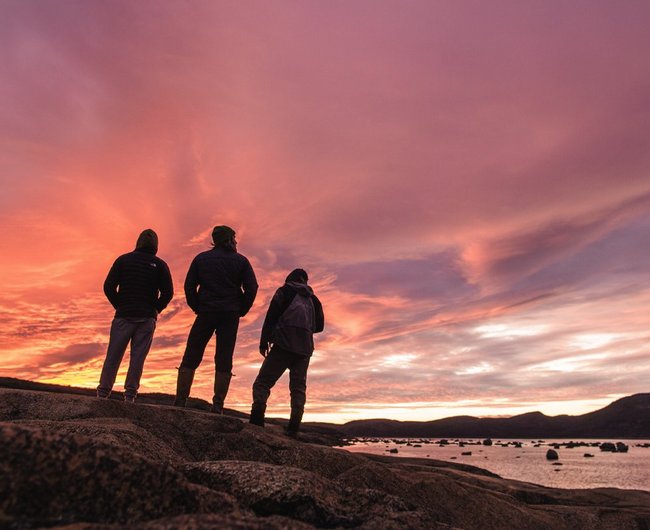
American Plan: Meals included
European Plan: Without meals
Outfitters operate on a territory according to either exclusive or non-exclusive rights. Outfitters with exclusive rights may have to comply with certain regulations.
EXCLUSIVE RIGHTS
Only the customers of the outfitter operating on the territory it leases are authorized to hunt, fish and trap.
NON-EXCLUSIVE RIGHTS
All hunters, anglers and trappers are authorized to practise their activity on the territory, even if an outfitter provides lodging and services.
If you have any questions, wish to learn more about hunting regulations or would you like a few practical tips, this section can provide you with the answers you seek and direct you to related sites.
To see the fishing regulations in effect in Québec, contact your outfitter or visit the Web site of the ministère des Forêts, de la Faune et des Parcs (Ministry of Forest, Wildlife and Parks) where you will find a host of information on fishing seasons, the provincial fishing zone map and recent regulation amendments. An overview of the regulations is presented below:
Fishing Licenses
There are three types of licenses in Québec:
- Fishing license for species other than salmon or monkfish
- Salmon fishing license
- Monkfish fishing license
All residents and non-residents must obtain a sport fishing license to practice this activity in Québec. The spouse and children under age 18 of a holder of a fishing license for species other than salmon or monkfish may fish without having their own license. A license holder must keep bring the license with him or her when fishing and must present it to a wildlife officer or assistant wildlife officer upon request.
A fishing license may be obtained from official license vendors, such as certain sports stores, hardware stores, corner stores or authorized outfitters.
For the cost of a fishing license or for any other information on the subject, see the Web site of the ministère des Forêts, de la Faune et des Parcs.
Catch Limits
There are catch limits to respect: daily quota, number of fish kept and fish size. The daily quota represents the maximum number of fish that can be caught by a license holder in a single day. The limit on the number of fish kept represents the number of fish that a holder may have in his or her possession at any one time, such as on his or her return from a fishing trip. Size limits are imposed on certain species of fish. All fish caught and kept by the spouse and/or children under age 18 of a license holder are included in the holder’s allowable catch limit.
Transporting Fish
Lors du transport, les poissons doivent toujours être conservés dans un état qui permet l’identification de l’espèce, le décompte total et l’évaluation de la longueur. La vente de prises est formellement interdite. Les pêcheurs désirant rapporter avec eux leurs prises doivent respecter la limite de possession.
Fishing Zones
Québec is divided into 29 fishing zones. Some regulations apply to all zones, while certain species-specific regulations apply to only a few zones.
If you have any questions, wish to learn more about hunting regulations or would you like a few practical tips, this section can provide you with the answers you seek and direct you to related sites.
To view the hunting regulations in effect in Québec, contact your outfitter or visit the Web site of the ministère des Forêts, de la Faune et des Parcs (Ministry of Forest, Wildlife and Parks) where you will find a host of information on hunting seasons, zone map and recent regulation amendments. An overview of the regulations is presented below:
Hunting License
Anyone who wishes to go hunting in Québec needs a hunting license. Hunters must have their license with them while hunting. The hunting license must be presented upon request to a wildlife officer or assistant wildlife officer. The license holder must sign his or her license.
The resident's hunting license is issued to any person residing in Québec who holds a valid hunter's certificate. A certificate is not required to hunt hares, eastern cottontails, leopard frogs, green frogs and bullfrogs. Anyone wishing to hunt migratory birds must obtain two licenses: the the migratory bird license available at the post office or online, and the small game hunting license. However, special terms and conditions apply for those who purchase an introductory license.
Anyone wishing to purchase a non-resident hunting license must reside outside Québec and be 12 years of age or older.
The Ministry has several options to make hunting in Québec enjoyable for the whole family.
A hunting license may be obtained from official license vendors, such as certain sports stores, hardware stores, corner stores or authorized outfitters. For the cost of a hunting license or for any other information on the subject, see the Web site of the ministère des Forêts, de la Faune et des Parcs.
Other Rules
You should be aware of the rules for bag limits and transporting, registering and exporting bagged big game animals. What should you do if you make an accidental kill? Is it legal to shoot a weapon from public roads or to go night hunting? What vehicles and watercraft can be used on hunting trips? How can a person with a disability obtain a hunting license? Other rules for hunting in Québec pertain to such topics as ammunition, hunting with dogs and the wearing of an orange safety vest. Consult the Web site of the ministère des Forêts, de la Faune et des Parcs for these informations.
Hunting Zones
Québec is divided into 29 zones, 28 of which are hunting zones. Each zone has its own requirements pertaining to ownership of the hunting grounds, the species living there, hunting seasons and bag limits.
Québec has close to 600 outfitters operating on its territory. These real estates located in the forest offer hunting, fishing and outdoor activities. They offer different packages that can include transportation to the site, lodging, meals, equipment and the services of a guide. The outfitter will also be able to provide you with information on the species present on its territory, on the opening period as well as on the catch and possession limits.
Outfitters have been present in Québec for over a century. The Québec Outfitters Federation (QOF) was founded in 1948, 75 years ago, and now has more than 330 active outfitters in all regions of Québec. Choosing a member of the QOF ensures that you are dealing with a wildlife professional who is bound by a code of ethics. A guarantee of quality! Discover this vast tourist network that offers the largest selection of quality accommodations and services in Québec, for hunting and fishing enthusiasts as well as for families looking for a vacation in the great outdoors.
ATTENTION NON-RESIDENT
Special rules apply to non-residents. Don’t be caught off guard: get the facts! Before your trip departure, please verify the policies and restrictions of each of the states/provinces you may go across on your way back home regarding meat and/or antlers transportation. Non-residents wishing to fish or hunt north of the 52nd parallel or east of the St. Augustin River (zone 19 south), as well as those hunting black bear, moose and woodcock south of the 52nd parallel (except in wildlife reserves and controlled harvesting zones [ZECs]), must use the service of an outfitter. Non-residents do not have to produce a hunter’s certificate to purchase a hunting license. Although they may use a gun, rifle, crossbow or bow to hunt game, they must use a gear authorized for each species and zone. They must also comply with Canadian gun legislation. For information on the use of firearms by a non-resident in Canada, visit www.rcmp-grc.gc.ca/en/firearms/non-residents.
GENERAL RULES, ZONES AND QUOTAS
Québec is divided into 29 fishing and hunting zones, according to species distribution. When hunting and fishing, you must respect the rules and quotas that apply in these zones and on the various bodies of water within them. You must also hold the appropriate licence for the chosen activity. Fishing and hunting seasons may vary from zone to zone.
In Québec, you can enjoy your favorite hunting activity in autumn and sometimes into early winter. Only black bear, snow goose and wild turkey can be legally hunted in spring. Whether you're on the shores of the St. Lawrence, in the boreal forest or on the tundra, you'll enjoy exploring the Québec landscape in search of your favorite game!
For hunting, periods and harvest limits are fixed according to species and are governed by a wildlife management plan. Hunters must obtain a hunting licence and abide by the regulations in force in the 29 hunting zones.
Complete information on the various aspects of hunting and fishing in Québec is available on the Québec Government website: https://www.quebec.ca/en/tourism-and-recreation/sporting-and-outdoor-activities.
Sport Fishing Regulation: https://www.quebec.ca/en/tourism-and-recreation/sporting-and-outdoor-activities/sport-fishing
Sport Hunting Regulation: https://www.quebec.ca/en/tourism-and-recreation/sporting-and-outdoor-activities/sport-hunting
Fishing Zone Maps: https://www.quebec.ca/en/tourism-and-recreation/sporting-and-outdoor-activities/sport-fishing/zones-periods/particular-rules
Hunting Zone Maps: https://www.quebec.ca/en/tourism-and-recreation/sporting-and-outdoor-activities/sport-hunting/hunting-zone-maps
Migratory Birds Regulation: https://www.canada.ca/en/services/environment/wildlife-plants-species/migratory-birds.html
Specific Information for Non-Resident: https://www.quebec.ca/en/tourism-and-recreation/sporting-and-outdoor-activities/sport-hunting/special-rules/non-resident-hunters
SAFETY
All hunters and anyone accompanying a hunter must wear a fluorescent-orange vest that covers the back, shoulders and chest, and is visible from any angle at all times. A life jacket must be provided for each person using any kind of boat. In addition, all boats must be equipped with a bailer, a sound signalling device, and a pair of oars.
REGULATION OF SPORT HUNTING
FIREARMS USE AND TRANSPORTATION
Non-residents must be 18 years of age or older to use a firearm in Canada or to bring one into the country. Non-residents coming to Canada without holding a Canadian firearms license must fill out a Non-Resident Firearms Declaration form before arriving at the entry point into Canada to save time. Do not sign the form; a Canada Border Services Agency (CBSA) customs officer must witness the signature. After a CBSA customs officer signs your Declaration, and that you paid the applicable fee (around $25), this temporary license is valid for 60 days. Visit the Royal Canadian Mounted Police website for more detail: https://www.rcmp-grc.gc.ca/en/firearms/non-residents.
TRAVELLING WITH A DOG
Dogs may be admitted to Canada if a licensed veterinarian in their country of origin has issued a valid rabies vaccination certificate. The certificate must clearly identify the dogs (full description of the animal) and attest that they are vaccinated against rabies. For more information, contact the Canadian Food Inspection Agency at: https://inspection.canada.ca/travelling-with-pets-food-or-plants/travelling-with-a-pet/eng/1575745860029/1575746174301. Make sure you contact your home country's authorities to prepare for the pet's return.
TRANSPORT AND EXPORT OF FISH AND GAME
Individuals who have in their possession, other than in their place of permanent residence, fish caught while sport fishing, must keep such fish in a condition making it possible to determine the species (enough skin left in place for identification), length (where length limits apply), and number. Non-residents may leave Québec with a quantity of fish equal to the possession limit for each species.
The transportation coupon and proof of registration allow for the transportation of big game or part of it, including fur, outside Québec. However, if the animal is a black bear, a Convention on International Trade in Endangered Species of Wild Fauna and Flora (CITES) permit is usually required to transport all or part of the animal outside Canada (see the section on Registration, transportation and registration for non-residents).
Any hunter who has killed a deer, moose, or black bear must immediately detach the appropriate transportation tag from his or her licence and affix it to the animal. The tag must remain attached throughout the registration process and until the animal has been dressed and stored. Where a moose has been bagged by a hunting party, the hunter who killed the animal and any other hunter participating in the hunt must ensure that their transportation tag is also affixed to the animal on the same day it is killed.
RESPONSIBILITIES OF FISHING AND HUNTING OUTFITTERS
Since they have no control over suppliers, outfitters cannot be held responsible if suppliers fail to provide the services described. In addition to the general conditions stated above, neither intermediaries nor outfitters can be held responsible for any damage, loss, delay, illness, injury or inconvenience arising from:
-
errors, negligence or omissions on the part of other suppliers such as carriers, hotels, etc.;
-
strikes, mechanical failures, quarantine or other restrictive government action, meteorological conditions, an act of God or other factors beyond human control such as forest fires or pandemic;
-
failure on the part of the customer to carry the necessary travel documents;
-
any airport delays on the customer’s day of departure, for whatever reason;
-
any material damage, loss of property or theft;
-
illness, injury, or death.
Ask your outfitter for more detail.
PRICES
Due to fluctuating exchange rates, the prices indicated on the website are subject to change. We therefore strongly recommend that you check the exact price when making your reservation with the outfitter of your choice. Prices quoted could include or not include applicable federal (GST), provincial (QST), and the lodging taxes.
TRIP CANCELLATION
Whether you are dealing with an outfitter or an intermediary, make sure to inquire about cancellation policies and refunds on deposits or full payments. These conditions should appear in the outfitter’s brochure or website and the booking contract.
INSURANCE
Most agencies offer trip cancellation, medical, and baggage insurance. For information on such policies, please contact the fishing or hunting agency of your choice. If the trip has not been completely paid for before your departure and you do not intend to settle the bill with cash, it is recommended that you verify whether the outfitter accepts personal cheques, travellers’ cheques or the credit card you plan to use.
BAGGAGE
Before departure, you should always check the weight limit on baggage with your airline carrier as well as the fees and policies related to bringing back meat and antlers.
ENTRY FORMALITIES AND CUSTOMS
Foreign visitors must have a valid passport. Visas are required for visitors from certain countries. In all cases, you should check with the Canadian consulate or embassy before departure. An electronic travel authorization is now required for citizens of several countries. To find out more, visit www.cbsa.gc.ca and www.cic.gc.ca.
CURRENCY, MONEY AND EXCHANGE OFFICES
The legal currency is the Canadian dollar, which is divided into 100 cents. There are denominations of 5, 10, 20, 50 and 100 dollars, as well as coins of 5, 10 and 25 cents, and 1 and 2 dollars. The best-known credit cards are accepted everywhere, including VISA, MasterCard and American Express. Traveller's checks are generally accepted in major hotels, some restaurants and department stores. Otherwise, they must be cashed at an exchange office or bank. There are numerous exchange offices in Québec's main cities. Airports also offer currency exchange services. Some shops accept American currency but offer a less competitive rate than exchange offices. Banks are generally open from 10 a.m. to 3 p.m., Monday to Friday.
Most ATMs (linked to the Cirrus, Système Plus or Interac networks) allow withdrawals at any time, seven days a week.
We advise you to contact your chosen outfitter to find out which payment methods are accepted on site.
HEALTH
Foreign travellers must pay their own medical expenses. Therefore, it is important to take out an insurance policy before leaving. Travelers carrying their medication with them are responsible for finding out about customs formalities from the Canada Border Services Agency. In pharmacies, medication is dispensed only on prescription from a physician who is a member of the Collège des médecins du Québec. In the event of a medical emergency, dial 911 from any telephone.
TAXES, SERVICES AND TIPS
In Québec, two taxes are added to the selling price of most products and services: the federal goods and services tax (GST) and the Québec sales tax (QST). In addition, there is a specific tax on lodging, which represents 3.5% of the room rate per night, before the GST and QST calculation. In restaurants, bars and cabs, you must leave a tip, not included in the bill, representing 10 to 15% of the total amount before taxes. At an outfitter, it's customary to tip staff such as guides and maintenance personnel.
WEATHER CONDITIONS
Most Québec cities have a humid continental climate, with four distinct seasons and significant temperature variations between them. Summer is hot, while winter is marked by heavy snowfalls. Québec's far north is characterized by subarctic and arctic climates. The ancestral land of the Cree and Inuit is renowned for its long winters and short summers.
| January | April | July | October | |
| MONTRÉAL | ‐12 °C / ‐5 °C | ‐2 °C / 11 °C | 17 °C / 26 °C | 5 °C / 12 °C |
| QUÉBEC | ‐17 °C / ‐7 °C | ‐1 °C / 7 °C | 13 °C / 25 °C | 1 °C / 10 °C |
| GASPÉ | ‐17 °C / ‐6 °C | ‐3 °C / 6 °C | 10 °C / 23 °C | 0 °C / 10 °C |
| KUUJJUAQ | ‐28 °C / ‐19 °C | ‐14 °C / ‐4 °C | 5 °C / 17 °C | ‐3 °C / 2 °C |
For detailed local forecasts and long-term trends, visit www.meteo.gc.ca
CODE OF ETHICS AND BASIC PRINCIPLES
Professional ethics are the basic principles of moral conduct and obligations that Québec Outfitters Federation (QOF) member must follow when dealing with society in general, as well as their clients, employees, and colleagues. They also include outfitters’ duties to the profession. Each outfitter that becomes a member of the QOF must respect the Federation’s Code of Ethics and basic principles.
Visit the QOF’s Code of Ethics section to learn more about it.
TRAVEL AND DRIVING
Buses connect many Québec cities, and numerous ferries provide annual or seasonal service on the St. Lawrence River and other major waterways. Most foreign driver's licenses are valid in Québec. Car rental agencies are plentiful, often with offices at airports and railway stations. Visitors may drive on Québec roads with a driver's license from their country of origin, for a maximum period of six months. An international driver's license is not mandatory. However, it is strongly recommended if your documents are in a language other than French or English.
Seatbelts must be worn by all car passengers. The consumption or presence of alcoholic beverages in a moving vehicle is strictly prohibited by the Code de la sécurité routière du Québec. In addition, anyone suspected of impaired driving must submit to a breathalyzer test. If the result reveals a level equal to or greater than 80 mg of alcohol per 100 ml of blood, the driver's license will be revoked immediately for a period of 30 days. Although the minimum age for driving a car is 16, some car rental companie may require a minimum age ranging from 18 to 25.
For more information on driving, road signs and getting around, visit the "Plan your trip" section of BonjourQuebec.com. For a detailed representation of the entire road network, obtain the Official Road Map of Québec.
ELECTRIC POWER
As elsewhere in North America, the power is 110 volts (60 cycles). For example, European plugs cannot be used, an adapter is required.
TELEPHONE AND MAIL SERVICES
Local calls can be made from a public telephone by paying with coins or prepaid cards (credit card payments are more expensive). For long-distance calls, prepaid phone cards are generally the most economical choice. How a cell phone works abroad depends on the technology used and the service offered by your outfitter.
Canada Post offers few options for visitors planning to spend several weeks in Québec without a fixed address. Visit https://www.canadapost-postescanada.ca/cpc/en/home.page for more information.
TOURIST INFORMATION
To prepare for your next trip, visit BonjourQuebec.com, the official tourism website of the Québec government. It's the most comprehensive reference tool for tourists. You'll find suggestions for activities, information on the different regions of Québec and their attractions, and a wealth of useful information. If you have any questions, please send an e-mail to [email protected].
Wondering if you need a Pleasure Craft Operator Card, commonly referred to as a boat license, to rent a motorized boat from an outfitter?
Navigating on the water requires a basic knowledge of boating safety and a good understanding of the "rules of the road" for Canadian waterways. That's why all operators of pleasure craft must carry proof of competency. This requirement applies to all types of motorized vessels, regardless of size or engine power (including small electrically powered vessels).
Which types of proof of competency are accepted?
For Canadians: proof of competency can take one of four forms:
- Proof of having successfully completed a boating safety course in Canada prior to April 1, 1999; or
- A pleasure Craft Operator Card (issued by a Transport Canada accredited course Provider). American cards are NOT accepted as proof of competency for Canadian citizens; or
- A complete rental boat safety checklist (for power-driven rental boats).
- A specified marine certificate – visit www.tc.gc.ca/boatingsafety for the approved list.
For non-residents, proof of competency can take one of three forms:
- An operator card or equivalent which meets the requirements of their state or country; or
- A pleasure Craft Operator Card (issued by an accredited Canadian Course Provider); or
- A completed rental boat safety (for power-driven rental boats).
To find out how to complete an ethics complaint, see the section provided for this purpose.
